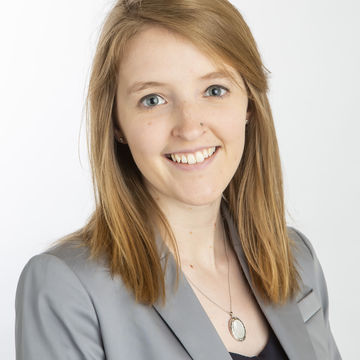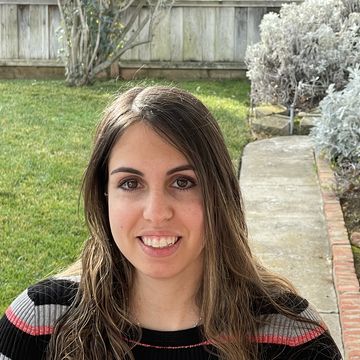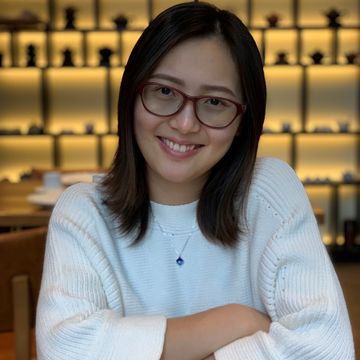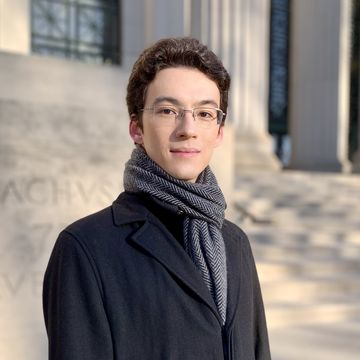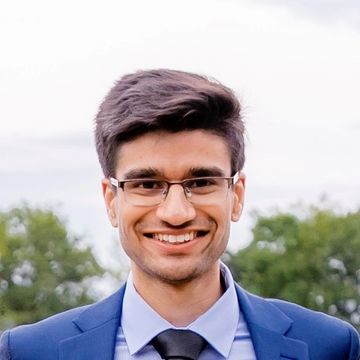Meet the Fellows
2023
Faculty Hosts: Risa Wechsler and Steven Allen
Christian Aganze earned his doctorate in physics from UC-San Diego in June 2023. Aganze is a galactic archaeologist. His research identifies brown dwarfs—cryptic celestial objects sometimes called “failed stars” because their temperatures and pressures did not become high enough to sustain hydrogen fusion and create stars. At Stanford, he hopes to identify brown dwarfs and low-mass stars (known as ultracool dwarfs) deep in the Milky Way using archival data from space-based missions and ground-based surveys (e.g., the James Webb Space Telescope and the Vera C. Rubin Observatory). Using this data, he will make predictions about the Milky Way’s structure and star formation history over time.
Faculty hosts: Chaitan Khosla and Justin Du Bois
Antonio Del Rio Flores earned a doctorate in chemical and biomolecular engineering from UC-Berkeley in 2023. Del Rio Flores studies natural products with the aim of developing new treatments for human diseases and uncovering novel enzymology. He will work with Chaitan Khosla to study the biosynthesis of a natural product (NOCAP) produced by bacteria associated with clinical cases of nocardiosis, a potentially life-threatening pulmonary disease. By researching the biological activity of NOCAP, Del Rio Flores plans to further our understanding of host–pathogen interactions to uncover new ways to treat nocardiosis.
Faculty host: Eva Silverstein
Yuk Ting Albert Law earned a doctorate in physics from Columbia University in 2021 and is a postdoctoral scholar at Harvard. Law’s research focuses on a theoretical curved space (called “de Sitter space”) that undergoes an accelerating expansion just like our own universe. His work has contributed to the knowledge of black holes and Euclidean path integrals in de Sitter space, an important tool in studies of semiclassical quantum gravity. Law will work with SSF faculty host Eva Silverstein to explore a bottom-up approach to developing a microscopic model of quantum gravity in de Sitter space.
Faculty hosts: Amir Dembo and Sourav Chatterjee
Theo McKenzie earned a doctorate in mathematics in 2022 from UC-Berkeley, where he studied probability and spectral theory with applications in the fields of statistical physics and computer science. As an SSF, he will build on his previous work investigating the structure of eigenvectors of linear operators on graphs for both deterministic and random models. His goal is to advance research in quantum chaos and probability theory. McKenzie has been the lead instructor of for-credit mathematics classes for incarcerated students in California and Massachusetts. He will continue this work while at Stanford.
Faculty host: Kristy Red Horse
Mira N. Moufarrej earned a doctorate in bioengineering from Stanford in 2021. Her research is among the first to demonstrate the clinical utility of RNA liquid biopsies for comprehensive prenatal care. Her research shows that studying circulating, cell-free RNA (RNA present in blood plasma) in the context of multifactorial syndromes like preeclampsia can yield a more nuanced understanding of complex health conditions. As a Stanford Science Fellow, Moufarrej plans to holistically characterize RNA biology in the cell and circulation with the aim of discovering and ultimately engineering new therapies.
Faculty hosts: Daniel Fisher and Benjamin Good
Avaneesh Narla will earn a doctorate in physics from UC-San Diego in May 2023. The focus of Narla’s research has been understanding how microbial populations respond to and shape their environment. At Stanford, he will work with faculty hosts Daniel Fisher and Benjamin Good to study the adaptations of microbial populations in changing environments. This research will be used to help understand how biological collectives respond to climate change and biodiversity crises. Narla also plans to extend what he has learned from studying microbial populations to collective adaptation and resilience to environmental changes in social-insect colonies, such as ant mounds and bee swarms.
Faculty hosts: Alison Hoyt and Leo Hollberg
Newton H. Nguyen will earn a doctorate in environmental engineering science from Caltech in the summer of 2023. Nguyen’s graduate research revealed that global measurements of methane emissions can be improved by accurately representing their atmospheric lifetimes. At Stanford, Nguyen will develop and deploy novel laser-based instruments to measure methane emissions at the scale of ecosystems. This research aims to improve the accuracy and cost-effectiveness of ecosystem monitoring while providing insights into how ecosystem carbon dynamics respond to climate change. Nguyen is also an advocate for the blind STEM community. He mentors blind students and co-founded multiple organizations to help disabled students in STEM.
Faculty host: Jacob Fox
Huy Tuan Pham earned a doctorate in mathematics from Stanford in the spring of 2023. His research focuses on combinatorics and probability, in particular the analysis of large networks and random networks. His work has applications in fields such as number theory, theoretical computer science, and machine learning. Among his research contributions to different areas in combinatorics and probability, he has proved the Kahn-Kalai conjecture on thresholds and Talagrand’s conjectures on suprema of selector and empirical processes. Pham will work with SSF faculty host Jacob Fox, as well as other faculty members in related areas, to further his research. He also hopes to help disadvantaged students from developing countries on their paths to pursuing research in mathematics.
Faculty hosts: Shanhui Fan and Jelena Vuckovic
Charles Roques-Carmes earned a doctorate in electrical engineering and computer science from MIT in 2022. The focus of his work is free-electron light-matter interaction, inverse design, and nanophotonics—how light behaves on the nanometer scale and the interaction of nanometer-scale objects with light. At Stanford, Roques-Carmes will work with SSF faculty hosts Shanhui Fan and Jelena Vuckovic to research the fundamental interactions between X-rays and matter, with a focus on developing new X-ray imaging modalities for use in medical imaging and nondestructive imaging (such as airport security scanning devices). His research aims to enhance X-ray imaging’s sensitivity, compactness, safety, and robustness.
2022
Faculty host: Michael Fayer
Kimberly Carter-Fenk earned a doctorate at The Ohio State University and came to Stanford as a postdoctoral scholar in 2021. In 2022 she will join the Science Fellows to pursue research on fundamental dynamics and intermolecular interactions in deep eutectic solvents, which have applications in the development of fuel cells. Carter-Fenk’s interests span quantum chemistry, spectroscopy, and climate science and sustainability. She was recognized for outstanding teaching at Ohio State, and at Stanford she has served as a mentor to first-generation and low-income students and a representative on the Disability Staff Forum.
Faculty host: Todd Martinez
Diptarka Hait comes to Stanford from the University of California, Berkeley, where he earned a doctorate in physical chemistry. His interests lie in computational quantum chemistry, and he has conducted research into how X-rays can be used to study chemical transformations. His graduate work was highly productive, leading to more than 20 publications. As a Science Fellow, Hait aims to use the tools of physics and mathematics to advance understanding of photocatalysts and chemistry in general. He also enjoys sharing his love of science as a teacher and mentor to younger scientists.
Faculty Host: Anne Dekas
Alexander Jaffe studies microbial ecology and evolution, with a special interest in microbial metabolism. As a Stanford Science Fellow, he plans to investigate how lifeforms in the deepest parts of the ocean contribute to the global carbon cycle, with implications for efforts to mitigate climate change. Jaffe earned a doctorate in microbiology at the University of California, Berkeley, where he has was involved in the CLEAR Project, which encourages early-career scientists to communicate with the public and be involved in their communities. In collaboration with Girls Who Code/College Track, he offered an introductory course in Python programming for high school students in Oakland.
Faculty host: Xiaojing Gao
Noa Katz earned a doctorate at the Technion, Israel Institute of Technology, and came to Stanford as a postdoctoral scholar in 2021. As a Science Fellow, she will pursue research at the intersection of physics, engineering, and the life sciences. Katz uses synthetic gene circuits to understand and manipulate the mechanics of neuro-regeneration in the human body, with therapeutic applications. She is the recipient of a Fulbright Scholarship and the Weizmann Institute of Science-Israel National Postdoctoral Award for Advancing Women in Science. She has long been involved in the iGEM international competition for students in synthetic biology, first as a participant and later as a mentor.
Faculty host: Liqun Luo
Cheng Lyu studied physics and computational biology at Peking University and went on to a doctorate in neuroscience at the Rockefeller University, where his experimental research yielded discoveries about how the brains of fruit files help them better navigate in space via vector computations. As a Stanford Science Fellow, Lyu will study how neural circuits, specifically the fly’s olfactory circuit, are assembled during the brain’s development. He enjoys teaching and is eager to be a mentor to young scientists.
Faculty host: Chris Garcia
Rong Ma is interested in using nanotechnology to answer questions in cell biology. After studying environmental science, Ma earned a doctorate at Emory University with research bridging chemistry and biophysics to investigate T cells, which defend against infections and cancer. As a Science Fellow, Ma will collaborate with researchers in medicine and chemistry to pursue breakthroughs in immunotherapy and cancer immunology. She is a co-founder and board member of the International Graduate Students and Scholars group at Emory. Ma was recently awarded the Michelson Prize for Human Immunology and Vaccine Research.
Faculty host: Jacob Fox
Jonathan Tidor earned a doctorate in mathematics at the Massachusetts Institute of Technology. His interests lie in the areas of discrete geometry and additive combinatorics. Tidor was part of a research team that solved a 70-year-old problem in geometry by determining the maximum number of equiangular lines for a given angle. He was active at MIT as an advisor and mentor in programs such as SPUR+, which aims to increase representation of women and underrepresented minorities in research mathematics.
Faculty Host: Lauren O’Connell
Vicky Watson-Zink studies how marine animals made the transition to terrestrial modes of life beginning more than 300 million years ago. Her doctoral research at the University of California, Davis, assessed the genetic changes that have allowed crabs to adapt to living on land. As part of that work, Watson-Zink is assembling the genome of the coconut crab, the planet’s largest terrestrial arthropod. Her published research has highlighted efforts to conserve the coconut crab and other threatened species. As a Science Fellow, Watson-Zink aims to explore the genetic basis of sea-to-land transitions by studying developmental transcriptomics in land crabs.
Faculty host: Tom Devereaux
Zoe Zhu’s research uncovers the physical properties of systems across scales, from quantum materials to climate systems. At Stanford, she aims to use machine learning to design tunable quantum materials and to explore the connections between quantum systems and climate science. Zhu completed a doctorate at Harvard University in the fields of physics and computational science and engineering. She was part of the Event Horizon Telescope Collaboration that received the Breakthrough Prize in Fundamental Physics in 2019. Zhu is dedicated to teaching and mentoring, especially students from backgrounds underrepresented in physics. She was awarded Harvard’s Certificate of Distinction in Teaching, Harvard University in 2021.
2021
Faculty Host: Molly Schumer
Stepfanie Aguillon holds a bachelor's and a master's degree from the University of Arizona and a PhD in ecology and evolutionary biology from Cornell University. She has interests in behavioral ecology and evolutionary biology and seeks to understand how genes influence the way organisms look and behave. As a Science Fellow, she plans to study the genetic basis of mate choice behavior in a hybridizing fish system. Aguillon’s research has appeared in Proceedings of the Royal Society B and PLoS Genetics, among other venues, and she has published on the topic of science education.
Faculty Host: ZX Shen
Zhurun Ji earned a doctoral degree in physics at the University of Pennsylvania. She pursues experimental and theoretical approaches in the area of condensed matter physics. Her work has appeared in the journals Science and Nature Materials. At Stanford she plans to investigate the nature of electrons and develop quantum materials for use in the next generation of green electronics.
Faculty Host: Jennifer Dionne
Cody McCoy received her PhD in organismic and evolutionary biology from Harvard University. She holds a master’s degree in environmental policy from Oxford University, where she was a Rhodes Scholar. The focus of McCoy’s research is biological adaptations related to light, such as the coloration that allows birds and spiders to absorb more than 99 percent of light and thus appear “super black.” Her work has been featured in outlets including Scientific American and The New York Times.
Faculty Host: Manu Prakash
Vishal Patil received his PhD from MIT in the field of applied mathematics. His work deals with topology and geometry in the context of elastic materials, including fibers with adaptive properties that are capable of mimicking neural networks and biological systems such as tumors. Patil’s research, which has been published in the journals Science and Nature, has applications in a range of fields, including engineering and medicine; he was collaborated with cardiac surgeons at Massachusetts General Hospital to improve surgical knots









